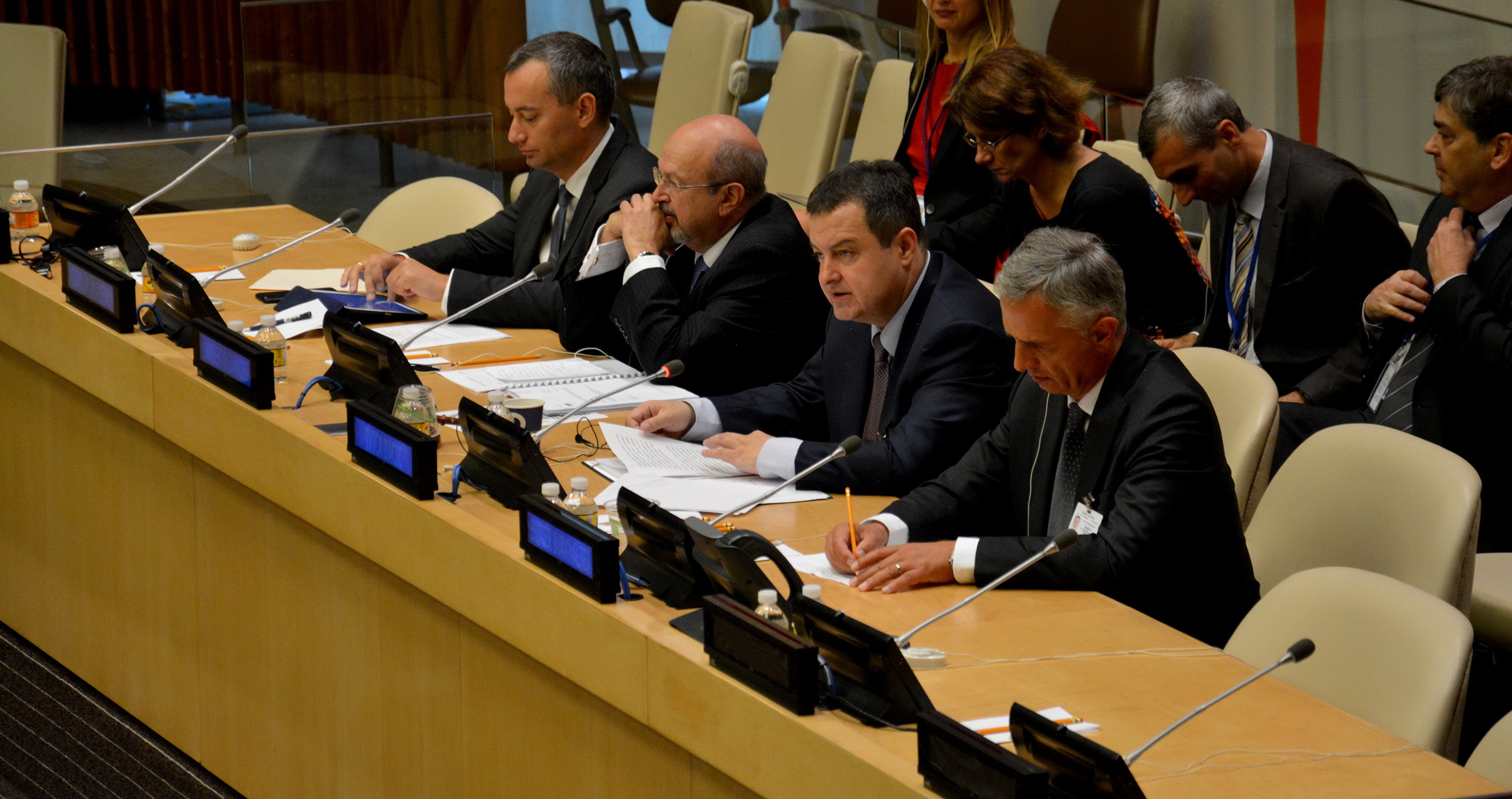



| Thursday, 01 October 2015. | |
| OSCE CiO Dacic at the Ministerial Event on “OSCE Peace Operations” | |
| + larger fontnormal font- Smaller font |
 Opening remarks by OSCE Chairperson-in-Office, Deputy Prime Minister and Minister of Foreign Affairs of the Republic of Serbia Ivica Dacic at the Ministerial Event "OSCE Peace Operations" held today in New York: Opening remarks by OSCE Chairperson-in-Office, Deputy Prime Minister and Minister of Foreign Affairs of the Republic of Serbia Ivica Dacic at the Ministerial Event "OSCE Peace Operations" held today in New York:Excellencies, Ladies and Gentlemen, Dear Colleagues, It is a great pleasure to welcome you in my capacity as OSCE Chairpersonin-Office to this Ministerial Event on “OSCE Peace Operations.” I am pleased that I am joined today by such a distinguished audience. I am also grateful to my colleague in the OSCE Ministerial Troika, Minister Burkhalter, for contributing to the event as keynote speakers. Let me also express my appreciation to OSCE Secretary General Lamberto Zannier for moderating today’s discussions. Excellencies, The Serbian OSCE Chairmanship has invited you to this event to exchange views on the Organization’s role in the maintenance of international peace and security. As the world’s largest regional security arrangement under Chapter VIII of the UN Charter, the OSCE is in a unique position to contribute to the peaceful settlement of disputes. In this context, its comprehensive and multi-dimensional approach to security is a unique asset. In line with that, the OSCE is constantly examining ways to further strengthen strategies and instruments of its conflict cycle toolbox. Peace operations represent a crucial element of this toolbox. The Organization is currently looking at ways to increase the OSCE’s capacity to launch and sustain complex peace operations of an essentially civilian nature. Such operations would be equipped with tailored assets and resources and could be deployed in different phases of the conflict cycle. The high level segment of the 70th session of the UN General Assembly provides an ideal setting for ministerial discussions on how the OSCE should advance this process. The United Nations has always been at the forefront of efforts to adapt peace operations to new challenges and crisis situations. Recently it gave fresh impetus to this debate with the on-going Peace Operations Review and the report of the High-Level Panel on Peace Operations that was presented to Secretary-General Ban Ki-moon in June.Lessons learned from the UN as well as from other international and regional organizations are extremely useful for the OSCE and its participating States. I am pleased that the representative of the Secretary-General is with us today, and I look forward to his contribution to our debate. Ladies and Gentlemen, The OSCE’s response to the crisis in and around Ukraine has once again demonstrated the Organization’s relevance in crisis management and conflict resolution, including its capacity to react quickly and to deliver on the ground. The swift deployment of the Special Monitoring Mission to Ukraine and the Observer Mission at the Russian Checkpoints Gukovo and Donetsk, supported by all other OSCE structures as well as relevant international partners, underscores that the OSCE remains a field-based organization. At the same time, our experience with the crisis in and around Ukraine has amplified the necessity to look for ways to adapt OSCE peace operations and its whole conflict-cycle toolbox to better cope with current and future challenges. This is all the more urgent in today’s security environment, in which organizations such as the OSCE are faced with a wide array of conflicts, old and new, as well as the emergence of increasingly complex, transnational and interconnected threats to security. In this respect, I would like to highlight that the Serbian Chairmanship, in consultation with the other two Troika members, has tasked the OSCE Secretariat to produce a scoping study which looks into the possibility of planning, deploying and maintaining complex OSCE peace operations. While these operations would be of an essentially civilian nature, they could include police or military elements without an enforcement mandate. I am confident that today’s discussions will generate useful ideas and forward-looking approaches that will help the Organization and its participating States to refine their conceptual thinking on how to plan and deploy complex peace operations. I very much look forward to productive discussions today. Thank you. |